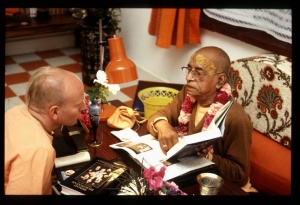CC Madhya 15.300

A.C. Bhaktivedanta Swami Prabhupada
TEXT 300
ṣāṭhīra mātāra prema, āra prabhura prasāda
bhakta-sambandhe yāhā kṣamila aparādha
SYNONYMS
ṣāṭhīra mātāra prema—the love of the mother of Ṣāṭhī; āra—and; prabhura prasāda—the mercy of Śrī Caitanya Mahāprabhu; bhakta-sambandhe—because of a relationship with a devotee; yāhā—where; kṣamila aparādha—Śrī Caitanya Mahāprabhu excused the offense.
TRANSLATION
Thus I have related the ecstatic love of Sārvabhauma’s wife, who is known as the mother of Ṣāṭhī. I have also related Śrī Caitanya Mahāprabhu’s great mercy, which He manifested by excusing Amogha’s offense. He did so due to Amogha’s relationship with a devotee.
PURPORT
Amogha was an offender because he blasphemed the Lord. As a result, he was about to die of cholera. Amogha did not receive an opportunity to be freed from all offenses after being attacked by the disease, but Sārvabhauma Bhaṭṭācārya and his wife were very dear to the Lord. Because of their relationship, Śrī Caitanya Mahāprabhu excused Amogha. Instead of being punished by the Lord, he was saved by the Lord’s mercy. All this was due to the unflinching love of Sārvabhauma Bhaṭṭācārya for Śrī Caitanya Mahāprabhu. Externally, Amogha was Sārvabhauma Bhaṭṭācārya’s son-in-law, and he was being maintained by Sārvabhauma. Consequently if Amogha were not excused, his punishment would have directly affected Sārvabhauma. Amogha’s death would have indirectly brought about the death of Sārvabhauma Bhaṭṭācārya.